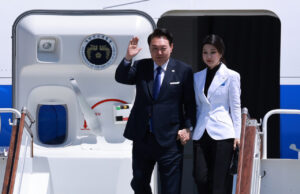South Korea Summit with Central Asian Countries
South Korea ‘s summit with 5 Central Asian countries is an integral component of its fresh diplomatic strategy for Central Asia euphemistically termed as “Korea-Central Asia K Silk Road.” President Yoon Suk Yeol is embarking on state visits to Central Asian nations namely Turkmenistan, Kazakhstan and Uzbekistan to access these countries abundant natural resources .Seoul’s First Deputy Director of National Security Kim Tae-hyo shared that 5 Central Asian countries including Kyrgyzstan and Tajikistan will establish the Korea-Central Asia Summit in Seoul next year.This summit will be on the heels of the Korea-Africa Summit held last week and envisaged to expand African countries maritime logistic routes .
 Credit ; Korea Herald
Credit ; Korea Herald
Korea’s Silk Road Initiative
The summit is being construed as the “K-Silk Road initiative,” designed to be launched with South Korea and Central Asian nations. Seoul’s emphasis is on energy and infrastructure cooperation with Kazakhstan, water resources and tourism partnerships with Kyrgyzstan and energy plant partnerships with Turkmenistan.
Critical Minerals
The ” K Silk Road Initiative ” is in line with the increasing strategic importance of the region which has abundant reserves of natural gas and key minerals including uranium, lithium and tungsten. The United States, European Union and Germany have each held several summits since 2022 and a the same time Russia and China are cultivating trade ties with the Central Asian bloc.
 Credit ; Korea Herald
Credit ; Korea Herald
Central Asia Threatened by Imperialism
Economic giants mainly U.S. and China are investing in the Central Asian countries perceived to be a new form of imperialism and being apprehensive in view of Russian economic sway in the past Korea’s ” K Silk Road Initiative “is being well received. The Central Asian countries are keen to partner with South Korea in the areas of infrastructure, industrial development, climate and digital technology. President Yoon Suk Yeol will hold summits in Kazakhstan with President Kassym-Jomart Tokayev and with President Shavkat Mirziyoyev . South Korea’s First Lady Kim Keon Hee will accompany him on the trip to Central Asia .
Free Trade Agreement
The Korea-Uzbekistan Free Trade Agreement (FTA ) will enable South Korea to diversify its export portfolio seen as vital amid escalating tension between the United States and China which jointly account for nearly 40 % of Korea’s exports. To relieve its trade reliance on these countries Seoul is increasing its trading partners by targeting 70 countries . South Korean business firms and corporates are being encouraged by Seoul to be deployed in critical roles in infrastructure projects to complement Uzbekistan government modernisation agenda. In the year 2019 South Korea exported $ 2.3 billion worth of goods and services to Uzbekistan while only $ 19.7 million of goods flowed the other way and the disparity is expected to be lessened.
Korea as a Market for Uzbek Products
Towards achieving the goal of reduction in unfavourable trade volumes and growing trade imbalance Uzbekistan needs to develop export promotion schemes on priority. As South Korea is the third largest food market in Asia-Pacific and the fifth largest globally Uzbekistan can seize this opportunity to export agricultural products. Lower tariffs arising from FTA will improve the competitiveness of Uzbek agricultural goods in Korean markets. Additionally Uzbekistan would be the first former Soviet republic to ink an FTA with Seoul.
Ports of Karachi
 Credit ; SeaTradeMaritime News
Credit ; SeaTradeMaritime News
Recently KTZ Express and JSC QazTrade carried out a multimodal transportation of cargo through the Trans-Afghan Corridor.Trucks carrying 2 containers each embarked from Pavlodar Special Economic Zone to Zhetygen Trade and Logistics Center where containers were loaded onto the trucks arriving at Karachi Port within 20 days and traversing a mainly overland route of 4,900 kilometers. The overall duration of the journey from Karachi Port to Jebel Ali Port took 38 days. The TIR convention was pressed into service .A further 60 containers are expected to be transported along this transit route in the months of June and July
Last year Uzbekistan’s trade volumes and cargos transported via the Georgian ports of Poti and Batumi increased from 503,000 tonnes to 864,000 tonnes. In early 2024 Batumi Sea Port LLC transported 6,012 tons of Kazakh ammonium nitrate and this cargo was shipped from the Kazakh port of Aktau to the port of Hovsan, Eastern Baku, Azerbaijan. It was further transported overland to the Georgian Black Sea seaport of Batumi for shipping onwards. This year AD Ports has invested in an intermodal logistics hub in Georgia which is due to come online later this year. AD Ports has inked an arrangement with Inveco for a 60% ownership in the port. AD Ports business view is that this intermodal logistics hub is placed on a strategic logistic corridor which connects manufacturing hubs in West Asia to consumer markets in Eastern Europe through ports in Kazakhstan, Azerbaijan, Armenia, Georgia and Türkiye. This logistic corridor also serves to connect the Caspian and Black seas with westward railway links to Türkiye and to Georgian Ports of Poti and Batumi, which further connect to European Black Sea ports in Bulgaria and Romania, while on the eastern connectivity side it links with different ports located along the Caspian Sea via a railway corridor to Azerbaijan.
AD Ports has invested in bulk and container terminals in Karachi Port Trust (KPT) and is an enviable position to offer an alternate logistic overland and maritime route from Central Asia to ports of Karachi. The ports of Karachi can facilitate transit trade from Central Asia to the Far East including South Korea, Japan, Indonesia and Malaysia. This overland and maritime route would reduce the freight and logistic costs of bulk and containers cargoes from the Central Asian countries by one third as compared with the existing route for the landlocked Central Asian countries. Uzbekistan , Kazakhstan and Tajikistan are at various stages of signing Transit Trade Agreements with Pakistan to utilise its sea ports. Operationalising of the Agreement on Transit Trade which was signed during the visit of the Tajik president to Pakistan in December 2022 needs to be fast tracked. Hurdles remain such as cross border procedures being antiquated and cumbersome custom regulations revision of which are being held up due to bureaucratic lethargy and apathy. The logistic corridor needs to be managed on B to B basis to ensure commercial viability. The transit trade and logistic spillover benefits to Pakistan may be in the range of $ 1 billion annually besides extending strategic economic outreach to Central Asia.
Authored by Nadir Mumtaz
Source : Credits
https://www.koreatimes.co.kr/www/nation/2024/06/113_376180.html
https://www.koreaherald.com/view.php?ud=20240613050722
https://oxussociety.org/the-promise-of-the-korea-uzbekistan-free-trade-agreement/
https://www.portseurope.com/batumi-sea-port-increases-traffic-in-kazakh-ammonium-nitrate/
https://www.seatrade-maritime.com/ports/ad-ports-acquires-60-stake-georgias-tbilisi-dry-port

Leave A Comment